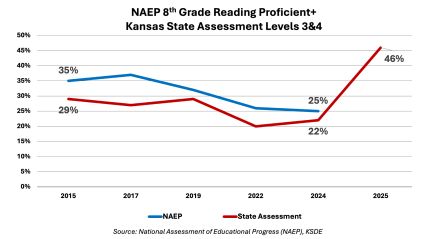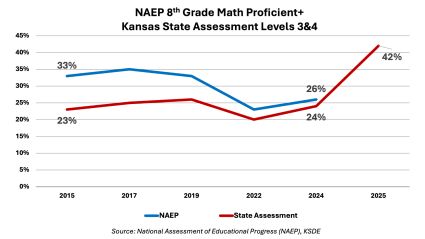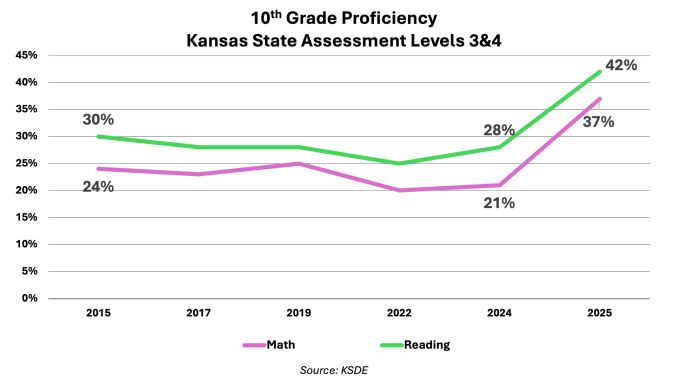The Kansas State Board of Education voted 7-3 this week to accept new cut scores for determining proficiency levels on the state assessment test, setting the stage for the Kansas Legislature to hopefully halt the imposition of less rigorous performance standards.
More on that shortly after a brief recap of the fraud being perpetrated on parents and students.
Beth Fultz, KSDE Director of Standards & Assessment Services, told the State Board of Education in May that, “We don’t want to drip our rigor so that our NAEP (National Assessment of Educational Progress) scores aren’t in balance.”
Fultz was talking about setting cut scores on the new state assessment test, which is similar to setting cutoffs in an A-F grading scale, with 90 being the ‘cut’ or minimum score needed to get an “A.” A school that changes from using a cut score of 90 this year for an “A” to just 75 next year will deceptively have many more students getting an “A” by reducing the standard. Setting cut scores on a new assessment is routine, but KSDE shouldn’t be using it as an opportunity to lower the bar so it appears that more students are proficient.
State assessment results closely tracked NAEP outcomes in recent years because the U.S. Department of Education said the Kansas definition of ‘proficient’ equated to the NAEP definition.
 In 2024, 25% of Kansas’ 8th-graders were proficient in reading on the NAEP, whereas 22% were proficient on the state assessment. Proficiency levels on both tests were generally on a downward decline for several years. Suddenly, the new standards on the 2025 state assessment show 46% are proficient.
In 2024, 25% of Kansas’ 8th-graders were proficient in reading on the NAEP, whereas 22% were proficient on the state assessment. Proficiency levels on both tests were generally on a downward decline for several years. Suddenly, the new standards on the 2025 state assessment show 46% are proficient.
Similarly, KSDE wants you to believe that 8th-grade math proficiency on the state assessment jumped from 24% to 42%.
 The Kansas Department of Education (KSDE) insists that proficiency levels soaring in one year– more than doubling in some cases – are not the result of reducing performance standards, but merely “fixing a misaligned system.”
The Kansas Department of Education (KSDE) insists that proficiency levels soaring in one year– more than doubling in some cases – are not the result of reducing performance standards, but merely “fixing a misaligned system.”
State school board members and Education Commissioner Randy Watson sagely nodded in agreement with Beth Fultz in May. Director Fults may have gotten nods this spring when discussing NOT dropping rigor, but that is exactly what happened anyway. It should be noted that State School Board members Dombrowsky, O’Brien, and Potter voted against the lower performance standards.
At the same May board meeting, board chair Cathy Hopkins said parents want assurance that they would be able to track progress from prior tests.
“I think the concerns I’m hearing from my constituents is that the changing these cut scores, changing these test performance, you know, definitions, actually changes our ability to compare what our kids in Kansas did this year to last year to two years ago, that we’re actually messing with within the State and not being able to track a true picture of what we’re doing.”
10th-grade proficiency levels exemplify parents’ concerns. Reading proficiency consistently hovered in the 20s for many years, only to see a huge jump to 42% with the new standards. Math proficiency nearly doubled, going from 21% to 37%.

Despite the unbelievable achievement jumps, KSDE officials assured Hopkins and the rest of the State School Board that parents’ fears of being able to honestly track performance trends are unfounded, and Hopkins sided with KSDE and voted to accept the new, lower performance standards.
The Legislature must decide whether to stop the proficiency fraud or be a willing participant
Claiming not to have so obviously reduced performance standards demonstrates that parents cannot count on the State Board of Education and the Department of Education it controls to address the achievement crisis in Kansas. The question now is whether the Legislature will use its authority to stop the fraud or become a willing participant by inaction.

As explained by attorney and former Speaker of the House Mike O’Neal, the Legislature could order KSDE to use an independent assessment, like ACT Aspire, to ensure rigor, independence, and the ability to establish trends.
“The current authority for SBOE to provide for state assessments is found at KSA (2024 Supp) 72-5170. It does NOT derive from Article 6 of the Kansas Constitution. The authority represents a legislative delegation of authority pursuant to the Legislature’s constitutional mandate in Art. 6, §1 to “provide for intellectual, educational, vocational and scientific improvement by establishing and maintaining public schools, educational institutions and related activities which may be organized and changed in such manner as may be provided by law. (emphasis added)
“Additionally, Art. 6, §2(a), which provides that the “The legislature shall provide for a state board of education which shall have general supervision of public schools, educational institutions, and all educational interests of the state, except educational functions delegated by law to the state board of regents. The state board of education shall perform such other duties as may be provided by law.” (emphasis added)
O’Neal says the phrase ‘as may be provided by law’ means the Legislature under Art. 2 of the Kansas Constitution, and the meaning of ‘related activities’ is established in caselaw.
“Kansas caselaw has made it clear that the phrase “related activities” covers a myriad of topics. Caselaw has also confirmed that the constitutional power of the SBOE is limited to general supervision, which has been defined by the Court as being “something more than to advise but something less than control.” It is also clear that the Kansas Constitution clearly contemplates that the Legislature will give the SBOE other tasks, and accordingly, may add to or take away responsibilities that are statutorily created. Legislative history confirms this happens virtually every legislative session since Article 6 was approved by the voters in 1964,” concluded O’Neal.
Some legislators shudder at the thought of doing anything that will upset the education lobby. Many of them know that a lot of students are not getting the education they deserve, and they want students to do better, but getting re-elected matters more. Voters who want them to intervene must therefore be very direct in communicating their position, such as:
“I am voting for a candidate in 2026 who tells the Department of Education to scrap its state assessment and replace it with an independent test, like ACT Aspire. Is that you?”











